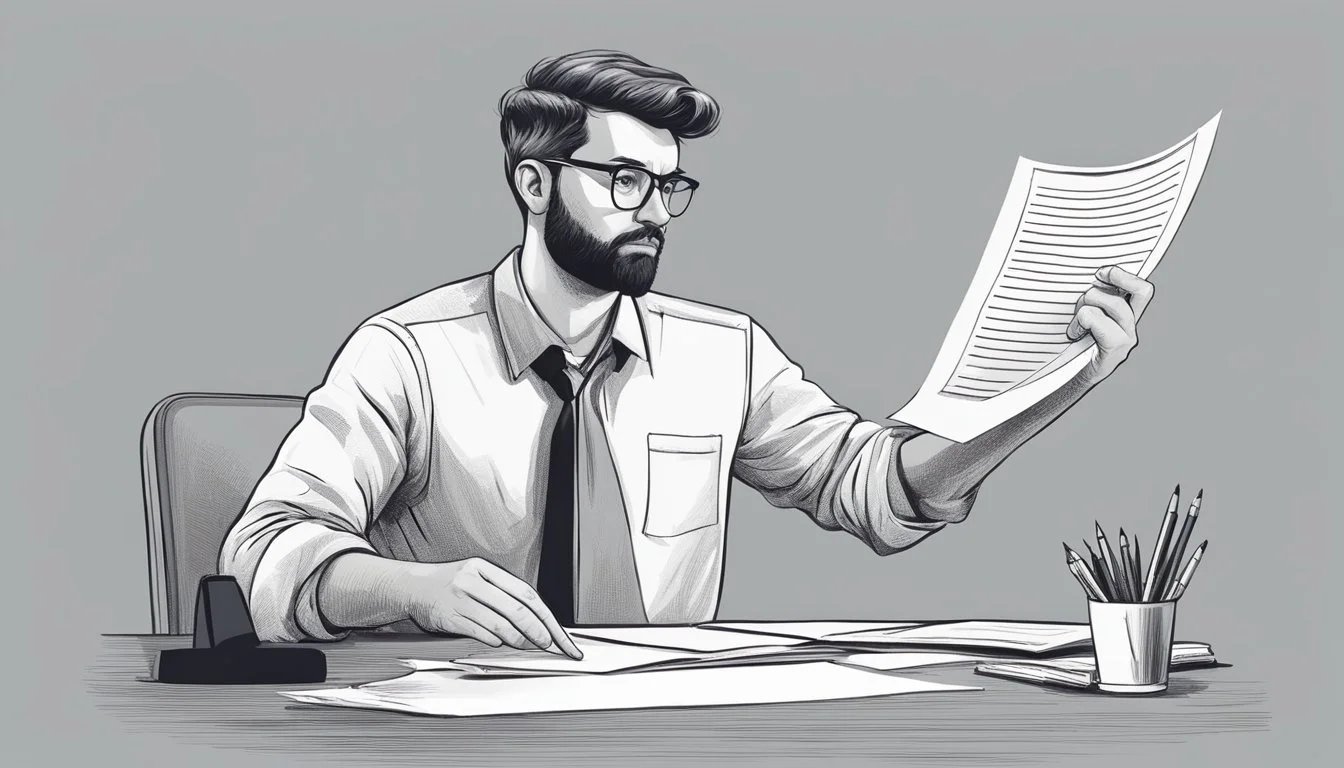9 Ways to Protect Your Creative Control from a Narcissistic Producer or Director
Essential Strategies for Filmmakers
In the entertainment industry, maintaining creative control can be a significant challenge, especially when dealing with narcissistic producers or directors. These individuals often use manipulation tactics to undermine and control the creative vision of others, justified by their inflated sense of self-importance and authority.
Safeguarding your creative autonomy requires strategic approaches and an understanding of the manipulative tactics often employed by narcissists. By recognizing these behaviors and implementing effective defenses, creatives can protect their work and maintain their artistic integrity in a collaborative yet sometimes precarious environment.
1) Establish Clear Boundaries
Setting clear boundaries is essential when dealing with a narcissistic producer or director. Define what behaviors are acceptable to you and communicate these boundaries directly. This helps in maintaining your creative control, ensuring that your work environment remains respectful and professional.
Do not justify, explain, or defend yourself. Narcissists often use scrutiny to make others second-guess themselves. Keeping responses concise and not over-explaining can prevent them from using your explanations against you.
Make it clear when something crosses the line. State explicitly what is not acceptable and stand firm on these issues. For instance, if undermining your decisions is a concern, specify this behavior as off-limits.
Use "no" as a complete sentence. It conveys your stance without opening the door for negotiations that might undermine your authority. Keeping your boundaries clear and unwavering signals that you have control over your creative contributions.
Reinforce your boundaries consistently. When your boundaries are tested, calmly reaffirm them. This consistency demonstrates that you are serious about maintaining your creative control.
Linking to further strategies, it is beneficial to know where to draw the line and recognize behaviors you are unwilling to tolerate. This proactive approach safeguards your creative integrity and minimizes conflict.
2) Document All Agreements
Keeping a written record of all agreements is crucial when working with a narcissistic producer or director. This practice ensures that both parties are clear on their rights and responsibilities.
By clearly outlining tasks, deadlines, and deliverables, you can avoid potential disputes. Written agreements help maintain transparency and accountability.
Specify all details in the agreement. Include project scope, financial aspects, and conflict resolution procedures. This provides a solid foundation for addressing any issues that might arise.
Regularly update the agreements to reflect any changes or new developments. Keeping all parties informed helps prevent misunderstandings and miscommunications.
E-mails, signed contracts, and meeting minutes serve as essential documentation. These records can be referred to during disagreements or legal inquiries.
For more tips on drafting agreements, explore effective co-producer agreements.
3) Seek Legal Advice Early
When dealing with a narcissistic producer or director, your first step should be to consult a legal professional. Early advice can help you understand your rights and options.
A lawyer familiar with entertainment law can provide crucial guidance. They can inform you about contracts, intellectual property, and how to safeguard your creative work.
Documentation is essential. Detailed records of interactions and agreements can strengthen your position. This helps in building a case if the situation escalates.
Legal counsel can also assist with specific strategies. For instance, they can advise on obtaining restraining orders if needed.
By involving a lawyer early, you lay a foundation for protecting your creative control. This proactive approach minimizes risks and helps navigate legal challenges more effectively.
4) Assert Your Vision Confidently
When dealing with a narcissistic producer or director, it is crucial for an individual to communicate their creative ideas with confidence. Assertiveness shows self-assurance and conviction in one's vision.
Utilize clear and firm language during discussions. Avoid wavering or appearing uncertain, as this may provide the narcissist an opportunity to undermine your viewpoint.
Prepare thoroughly before meetings. Anticipate questions or objections to your ideas and have concise, factual responses ready. This preparation can reinforce your position.
Maintaining composure is equally important. Keep emotions in check and focus on the facts and merits of your vision. A calm demeanor can help in conveying confidence and determination.
Consistently expressing your commitment to your creative ideas can help gain respect, even from a narcissistic counterpart. Reiterate the value and purpose of your vision whenever necessary.
Setting clear boundaries when communicating your ideas can also be beneficial. Be explicit about what aspects of your vision are non-negotiable, ensuring there's no ambiguity about your stance.
Fostering a supportive network within the team can provide additional reinforcement. Allies who believe in your vision can amplify your voice and create a collective front, making it harder for the narcissist to dominate.
By consistently asserting your vision confidently, you can protect your creative control and maintain the integrity of your work.
5) Build a Reliable Support Network
Creating a reliable support network is essential to maintaining creative control in the face of narcissistic manipulation. Seek out individuals who have your best interests at heart. This group can include friends, family, colleagues, or professionals.
Surround yourself with people who understand your situation. Having a network of trusted individuals helps counteract any attempts to isolate you from your support system.
Maintain open and honest communication within your network. Regular check-ins and discussions can help keep everyone informed and unified in their support.
Identify professionals who can provide guidance and resources. This might include mental health professionals, lawyers, or industry advisors who can offer expert advice.
Ensure your support network is varied. Different perspectives can provide a more balanced view and help you navigate the challenges posed by a narcissistic producer or director.
6) Stay Organized and Detail-Oriented
Maintaining organization is crucial when working with a narcissistic producer or director. Keeping track of all aspects of your project can help you stay on top of tasks and reduce stress. A well-organized workspace allows you to find important documents quickly and keep everything in its proper place.
Using tools like to-do lists or project management software is beneficial. Setting clear priorities ensures you spend time on the most important tasks first. Online tools can help you set deadlines and track progress, preventing last-minute rushes.
The Pomodoro Technique can improve focus. Working in short bursts followed by breaks can keep you productive without burnout. Attention to detail can help catch any mistakes early, ensuring high quality in your work.
A neat and orderly workspace can also contribute to a clearer mind. Simple practices like desk decluttering can make a significant difference. Keeping only necessary items within reach reduces distractions and keeps your work environment efficient and professional.
7) Demand Transparency in Decisions
When dealing with a narcissistic producer or director, insisting on transparency in decision-making processes is crucial. Narcissists often operate through manipulation and secrecy to maintain control. Clear communication ensures that everyone is on the same page and that creative decisions are made for the benefit of the project, not the ego of one individual.
Request regular updates on project progress and the rationale behind major decisions. This approach helps to prevent hidden agendas and promotes a collaborative environment. If a decision impacts your work, ask for detailed explanations and be prepared to provide constructive feedback.
Documenting decisions and communications can also be beneficial. Keeping written records helps maintain accountability and provides clarity in case disputes arise. This step discourages arbitrary changes and helps everyone feel more secure about the project's direction.
Encourage a culture where team members feel comfortable asking questions and expressing concerns about decisions. A transparent process reduces the likelihood of misunderstandings and helps preserve your creative control.
Demanding transparency isn’t about confrontation; it’s about establishing a professional standard where decisions are clear, justified, and inclusive. This strategy protects the integrity of the project and supports a more respectful and productive working relationship.
8) Know Your Rights
Understanding your rights is crucial when dealing with a narcissistic producer or director. The right of publicity protects your identity and likeness from unauthorized exploitation. This right is recognized under both common law and statutory law, although specifics vary by state.
Copyright law protects your creative works. Under U.S. law, copyright protects the expression, not the underlying ideas. This law grants you the right to reproduce, display, and distribute your work, and create derivatives.
It's important to document your creative process. Keeping records of drafts and final pieces can serve as valuable evidence in disputes. Detailed documentation can prove your ownership and the originality of your work.
Knowing these rights empowers you to assert control over your creations. Awareness of your publicity rights and copyright laws can prevent misuse of your work and likeness. This knowledge can be a powerful tool to use against those who might try to take undue credit or control.
In cases of dispute, consider consulting with legal professionals who specialize in intellectual property law. They can provide guidance and help enforce your rights effectively.
Familiarizing yourself with these legal protections can significantly strengthen your position. By knowing your rights, you create a safeguard against manipulation and unauthorized use of your creative works and identity.
9) Protect Your Intellectual Property
Securing intellectual property is crucial for maintaining creative control. Registering copyrights, trademarks, and patents with government bodies ensures legal ownership. This is a fundamental step for protecting any creative work from unauthorized use.
For additional security, consider documenting discoveries and innovations. This creates a verifiable record of your creative process and ideas, aiding in potential legal disputes over ownership rights.
Using digital rights management (DRM) software can help control access to digital content. This restricts unauthorized copying or distribution, protecting the integrity and value of your work.
Strong nondisclosure agreements (NDAs) can prevent misuse of your intellectual property by those who have access to sensitive information. NDAs ensure that collaborators and stakeholders respect confidentiality.
Trade secret laws also play a vital role. These laws protect valuable, non-public information. Ensure that anyone with access to such information understands their fiduciary duty to protect it.
Registering your work officially with the government, such as copyrights, can offer added legal protection. This allows for easier enforcement of rights if infringements occur. Registering typically costs between $45 and $65 but provides significant benefits.
For more insights on protecting intellectual property, visit LegalZoom's guide on how to protect your intellectual property. Helpful tips from IP lawyers can also be found on Descript's blog.
Understanding Creative Control
Creative control refers to the power an artist has over the artistic aspects of their work. For actors, directors, and other creatives, maintaining this control is key to upholding their vision and achieving artistic integrity.
Defining Creative Control
Creative control, also known as artistic control, is the authority to make decisions regarding the artistic elements of a project. This power permits the creator to guide the development, design, and final presentation of their work.
In the film and television industry, directors often have creative control over aspects such as casting, script changes, and visual style. For example, an actor with creative control may influence the interpretation of their character, ensuring it aligns with their artistic vision. This control is vital in preserving the artistic essence and preventing outside influences from diluting the work.
The Importance of Maintaining Creative Integrity
Maintaining creative integrity ensures that the creator's original vision remains intact throughout the project. It safeguards the authenticity of the work and helps in producing a product that genuinely reflects the creator's intentions.
Compromising on creative control can lead to a final product that diverges significantly from the original concept. By preserving creative integrity, directors and actors can deliver more impactful and cohesive narratives. This integrity is particularly crucial when working with a narcissistic producer or director, as they may attempt to manipulate or alter the vision to serve their own interests.
Ensuring that creatives retain their control allows for more genuine and effective storytelling.
Recognizing Narcissistic Behavior in Producers or Directors
Narcissistic producers or directors often exhibit behaviors that can hinder the creative process. Identifying these traits early can help in navigating and maintaining creative control effectively.
Common Traits and Red Flags
Narcissistic individuals in leadership roles may display traits such as an inflated sense of superiority, constant need for admiration, and a lack of empathy. In a production setting, this can manifest as dominating conversations, dismissing others' contributions, and taking undue credit for team efforts.
Watch for specific behaviors like blaming others for setbacks, making unrealistic demands, and manipulating team members for personal gain. They may also react negatively to criticism, resorting to personal attacks or passive-aggressive behavior.
Other red flags include creating a competitive environment that pits team members against each other and a tendency to micromanage, stifling creativity and innovation.
Impact on Creative Processes
Narcissistic behavior can significantly impact the creative process. They often impose their own vision, ignoring input from other creative professionals. This can lead to a narrow approach that does not consider diverse ideas or potential improvements.
Such producers or directors may change project directions impulsively, creating confusion and disrupting workflow. Their need for control can result in excessive revisions, causing deadlines to be missed and quality to suffer.
The lack of empathy makes it difficult for them to appreciate the emotional and intellectual input of their team. Consequently, morale may drop, leading to decreased productivity and a hostile work environment, which further stymies creative efforts.
Effective communication and setting boundaries early are crucial to mitigating the negative effects of narcissistic behavior on creative projects.
Strategies to Safeguard Your Creative Vision
Balancing artistic integrity and collaborative demands requires a proactive approach. The following strategies focus on establishing boundaries and enhancing communication to maintain creative control.
Establishing Clear Boundaries
Setting firm boundaries at the onset of a project is crucial. Clear contracts detailing your creative rights and responsibilities can prevent future conflicts. Ensure that these agreements define the extent of your creative input and authority.
Schedule regular check-in meetings to review progress. This allows you to reaffirm your vision and address any deviations early. Make use of tools like project management software to track tasks and milestones, keeping everyone aligned with the original goals.
Document everything. Keep records of all communications, decisions, and feedback. This documentation can serve as evidence if disputes arise.
Effective Communication Tactics
Communication is key to protecting your vision. Practice assertive communication by expressing your ideas confidently and respectfully. Make it clear why certain creative choices are non-negotiable for the integrity of the project.
Use visual aids such as storyboards, mood boards, and presentations to articulate your vision. These tools can help others see your perspective more clearly and reduce misunderstandings.
Encourage open dialogue. Create an environment where team members feel comfortable sharing their thoughts and concerns. This can prevent conflicts and foster a collaborative rather than combative dynamic.
Incorporate these tactics to safeguard your creative vision and maintain a productive working relationship with even the most challenging collaborators.









